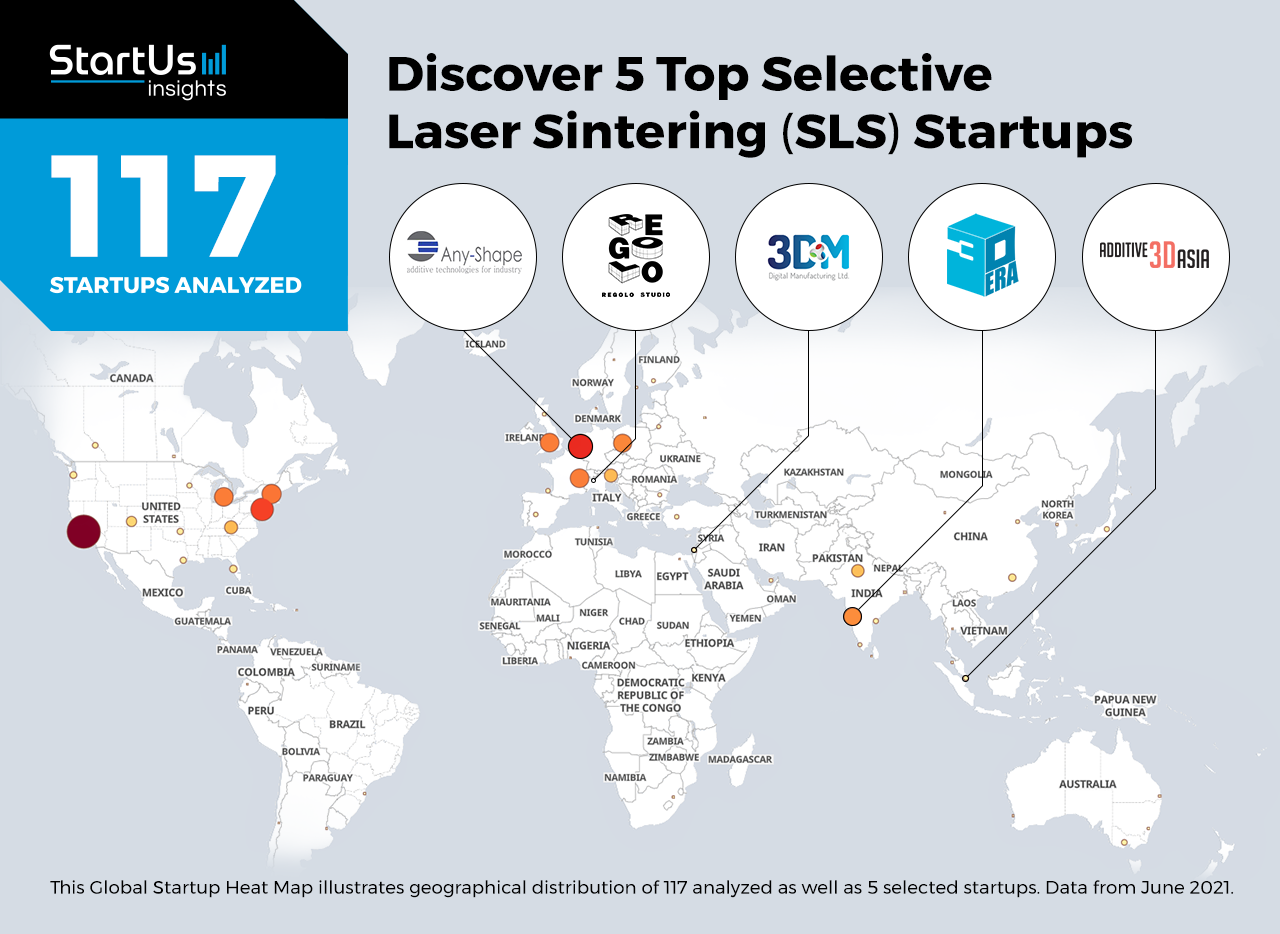Accelerate Productivity in 2025
Reignite Growth Despite the Global Slowdown
Staying ahead of the technology curve means strengthening your competitive advantage. That is why we give you data-driven innovation insights into Industry 4.0. This time, you get to discover 5 hand-picked selective laser sintering startups.
Global Startup Heat Map highlights 5 Top Selective Laser Sintering Startups out of 117
The insights of this data-driven analysis are derived from the Big Data & Artificial Intelligence-powered StartUs Insights Discovery Platform, covering 2.093.000+ startups & scaleups globally. The platform gives you an exhaustive overview of emerging technologies & relevant startups within a specific field in just a few clicks.
The Global Startup Heat Map below reveals the distribution of the 117 exemplary startups & scaleups we analyzed for this research. Further, it highlights 5 SLS startups that we hand-picked based on criteria such as founding year, location, funding raised, and more. You get to explore the solutions of these 5 startups & scaleups in this report. For insights on the other 112 SLS solutions, get in touch.
3D Era Tech uses Nylon 12 for Selective Laser Sintering
Selecting the right material for SLS is crucial as it defines the properties of the final product. Depending on the industry, certain properties may take precedence over others. For example, 3D-printed prosthetics need to be resistant to abrasion and stress. Since Nylon 12 absorbs less moisture, retains impact strength, and dampens noise or vibration, companies prefer using it for SLS. Startups also develop nylon 12 SLS solutions to print custom orthotics in the healthcare industry. Other applications include printing gaskets, seals, and other parts for industrial purposes.
Indian startup 3D Era Tech utilizes nylon 12, also known as polyamide 12, in SLS. It melts nylon-based powders into solid plastic and prints them to the desired shape. These parts are durable and useful for functional testing. They also have the ability to support living hinges and snap-fits. Further, Nylon 12 imparts high-temperature resistance and flexibility to the fabricated part. The startup also uses glass-filled nylon and provides other additive manufacturing services, such as direct metal laser sintering (DMLS) and stereolithography (SLA).
3DM develops Laser Technology
Contemporary lasers do not achieve the degree of precision required in 3D printing. Instead of refining the lasers, manufacturers typically alter the material by adding absorption-improving filaments or using sub-optimal lasers. To overcome this, startups develop laser-based technologies that increase the efficiency of the laser head through high-powered light sources. Such solutions also provide a greater retention of dimensional stability and integrity to the printed parts.
Israeli startup 3DM refines laser technology for SLS. The 3DM laser is a low-cost semiconductor component with a high-power light source. It extends up to 4W equivalent of 20W CO2 lasers. The laser is customizable to emit at any wavelength in the mid-infrared (IR) spectrum, thus optimally matching the absorption properties of a large variety of materials. The laser also enables accurate sintering of the material in the Z-axis, preventing print distortions between printed layers to improve overall print quality.
Regolo Studio uses Alumide & Carbonmide for SLS
Parts printed through SLS do not have the capabilities of parts produced through metal laser sintering (MLS). This is because the materials used in SLS are plastics or long-chain polymers that do not have the chemical and physical properties of metals. However, owing to the time and temperatures required to achieve MLS, SLS provides a faster alternative. To compensate for the properties of materials, startups develop plastics coated with metals, such as aluminum, for use in SLS. These materials offer increased tolerance to high temperature or impact, boosting their usability for SLS.
Italian startup Regolo Studio develops Alumide and Carbonmide for SLS. These are formulations of nylon 12 loaded with aluminum and carbon respectively and are characterized by their high rigidity and metallic appearance. Parts developed using these materials display dimensional accuracy, balanced ratio of density, rigidity, lightness, and thermal conductivity. The startup also offers SLA and fused deposition modeling (FDM) services.
Any-Shape engineers Thermoplastic Polyurethane (TPU) Solutions for SLS
Thermoplastic elastomers (TPE) find applications in industrial and mechanical engineering, as well as manufacturing, as powders for SLS. These materials have both thermoplastic and elastomeric properties. Startups use TPU in additive manufacturing as it provides durability and enables the production of complex shapes. Manufacturing startups use TPU for SLS to manufacture seals, ducts, dampers, and pads, among other parts.
Belgian startup Any-Shape uses TPU for 3D printing via SLS. The laser melts TPU powder (BASF 90 Flex) to print both functional prototypes and structural serial parts. This is possible due to the material’s high mechanical and thermal resistance. Further, it only takes a short time to complete the printing while producing parts with intricate geometries. The startup also offers SLS for nylon, flame-retardant nylon, and Alumide, as well as FDM and selective laser melting (SLM) services.
Additive3D Asia utilizes Glass-filled Nylon for SLS
Nylon 12, while suitable for a wide range of applications, has its own limitations. For example, its use in parts that are exposed to high static loads over long periods, in high-temperature conditions, is not viable. This is why startups develop glass-filled nylon for SLS to fabricate parts used in high-stress or high-temperature settings. Glass-filled nylons display very high rigidity, and high mechanical strength, as well as a high degree of toughness.
Singaporean startup Additive3D Asia offers glass-filled nylon solutions for SLS which consists of 30% glass fibers to produce industrial parts with high strength and stiffness. Compared to standard nylon, this material simultaneously achieves low abrasive wear and complex geometries, while imparting high stiffness and improved thermal and abrasion resistance to the printed parts. The startup also provides solutions for FDM, multi-jet fusion (MJF), and more.
Discover more Industry 4.0 Startups
SLS startups, such as the 5 examples highlighted in this, report focus on new materials and coatings for SLS as well as high-precision technologies for SLS processes. While all of these technologies play a major role in advancing Industry 4.0, they only represent the tip of the iceberg. To explore more advanced manufacturing technologies, simply get in touch to let us look into your areas of interest. For a more general overview, you can download our free Industry 4.0 Innovation Report to save your time and improve strategic decision-making.


![Future of Robotics: 12 Trends Powering the Next Wave [2025-2030]](https://www.startus-insights.com/wp-content/uploads/2025/06/Future-of-Robotics-SharedImg-StartUs-Insights-noresize-420x236.webp)





